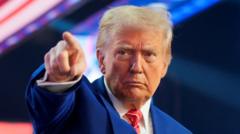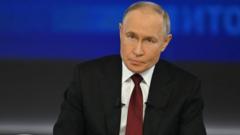In a significant political development, Vietnam's National Assembly has officially confirmed Luong Cuong as the new president, reviving the country's longstanding power-sharing arrangement known as the "four pillars." This structure is designed to distribute key leadership roles between the general secretary, president, prime minister, and head of the National Assembly to prevent any individual from monopolizing power.
Vietnam Restores Power-Sharing Leadership with New President Luong Cuong

Vietnam Restores Power-Sharing Leadership with New President Luong Cuong
Vietnam's National Assembly reinstates the "four pillars" system to enhance government stability amidst political speculation.
Luong Cuong, a general in the Vietnamese Army, takes over the presidency amid ongoing discussions regarding the influence of To Lam, the recently appointed general secretary of the Communist Party. Concerns mounted when Lam, previously both the president and the minister of public security, was thought to be positioning himself to maintain dual roles. The reinstatement of the four-pillar system reflects a move away from the consolidation of power that had occurred in recent years, particularly during Nguyen Phu Trong's time as both general secretary and president from 2011 until his death in 2024.
In his opening speech, Lam expressed gratitude to his colleagues for their cooperation at a time of complex regional and global challenges, while Cuong emphasized his commitment to safeguarding national independence and integrity. Observers believe that the return to a more diverse leadership approach may reduce internal factional disputes and promote stability as Vietnam aims for economic advancement and a strengthened global position. Political analyst Nguyen Khac Giang noted that involving military leadership prominently could further facilitate a more balanced political environment following recent upheavals.
As Vietnam navigates its political landscape, the new leadership arrangement may bolster the government’s efforts towards achieving its developmental goals, signaling a thoughtful approach to governance in the Communist regime.
In his opening speech, Lam expressed gratitude to his colleagues for their cooperation at a time of complex regional and global challenges, while Cuong emphasized his commitment to safeguarding national independence and integrity. Observers believe that the return to a more diverse leadership approach may reduce internal factional disputes and promote stability as Vietnam aims for economic advancement and a strengthened global position. Political analyst Nguyen Khac Giang noted that involving military leadership prominently could further facilitate a more balanced political environment following recent upheavals.
As Vietnam navigates its political landscape, the new leadership arrangement may bolster the government’s efforts towards achieving its developmental goals, signaling a thoughtful approach to governance in the Communist regime.





















